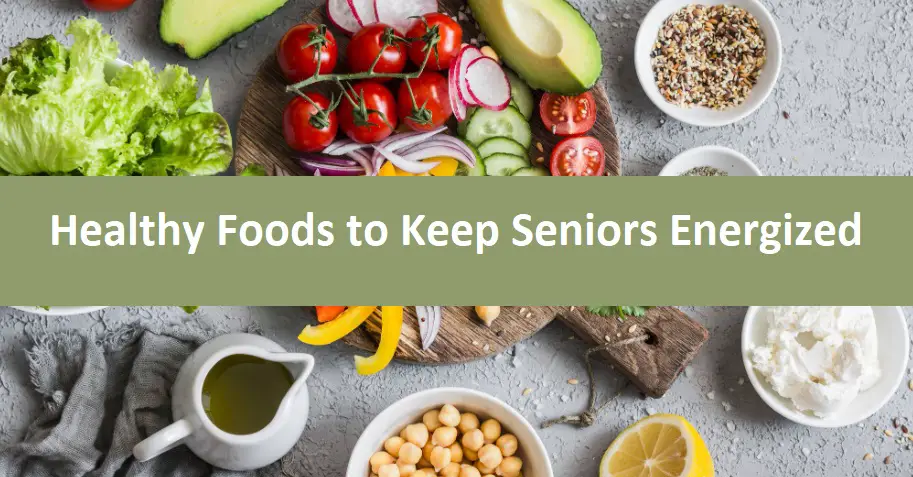As we age, our body undergoes several changes that can lead to a decrease in energy levels. One way to combat this is through a healthy diet that includes foods that provide the nutrients and energy needed to keep seniors feeling their best. In this article, we will explore five healthy food options that can help keep seniors energized. Stay tuned!
Hummus and Carrots
Hummus and carrots are a great combination of healthy fats, protein, and fiber. Hummus is made from chickpeas, which are a great source of protein and fiber. It also contains healthy fats from olive oil, tahini, and lemon juice. Carrots are low in calories but high in fiber and vitamins. Combining hummus and carrots provides a balanced snack that can help seniors maintain their energy levels throughout the day.
Benefits:
- Chickpeas are a great source of protein, which is essential for building and repairing tissues in the body.
- Chickpeas are also high in fiber, which helps regulate digestion and prevent constipation.
- The healthy fats in hummus can help reduce inflammation in the body and lower the risk of heart disease.
- Carrots are high in vitamins A and C, which are essential for maintaining healthy skin and boosting the immune system.
Tuna and Other Cold Water Fish
Tuna and other cold-water fish, such as salmon, sardines, and mackerel, are excellent sources of omega-3 fatty acids. Omega-3s are essential for maintaining brain health and reducing the risk of heart disease. These fish also contain high-quality protein, which is essential for building and repairing tissues in the body.
Benefits:
- Omega-3 fatty acids can help improve brain function and reduce the risk of Alzheimer’s disease and dementia.
- Omega-3s can also reduce inflammation in the body, which can help lower the risk of heart disease and stroke.
- High-quality protein is essential for building and repairing tissues in the body, which can help maintain muscle mass and prevent muscle loss associated with aging.
Pumpkin Seeds
Pumpkin seeds are a great source of protein, healthy fats, and fiber. They are also high in vitamins and minerals, including magnesium, potassium, and zinc. Magnesium is important for maintaining healthy bones and muscles, while potassium is essential for regulating blood pressure. Zinc is important for maintaining a healthy immune system.
Benefits:
- The protein and healthy fats in pumpkin seeds can help maintain energy levels and prevent hunger cravings.
- The high fiber content can help regulate digestion and prevent constipation.
- Magnesium is essential for maintaining healthy bones and muscles, which can help prevent falls and fractures in seniors.
- Potassium is important for regulating blood pressure, which can help lower the risk of heart disease and stroke.
- Zinc is important for maintaining a healthy immune system, which can help prevent infections and illnesses.
Watermelon
Watermelon is a refreshing fruit that is high in water content and low in calories. It is also a great source of vitamins A and C, as well as potassium. Watermelon can be eaten as a snack or added to a smoothie for a refreshing and energizing drink.
Benefits:
- The high water content in watermelon can help prevent dehydration, which is common in seniors.
- The low-calorie content makes it a great snack option for seniors who are watching their weight.
- The vitamins and minerals in watermelon can help boost the immune system and maintain healthy skin.
Dark Chocolate
Dark chocolate is a delicious treat that is also high in antioxidants. Antioxidants are important for reducing inflammation in the body and protecting cells from damage. Dark chocolate is also a good source of iron, magnesium, and zinc.
Benefits:
- The antioxidants in dark chocolate can help reduce inflammation in the body, which can lower the risk of chronic diseases such as heart disease and cancer.
- Iron is essential for transporting oxygen throughout the body and preventing fatigue.
- Magnesium is important for maintaining healthy bones and muscles, as well as regulating blood sugar levels.
- Zinc is important for maintaining a healthy immune system and promoting wound healing.
The Importance of Eating Healthy
Eating a healthy diet is essential for maintaining good health, especially as we age. Seniors are at a higher risk of developing chronic diseases such as heart disease, diabetes, and cancer, which can have a significant impact on their quality of life. A healthy diet that includes a variety of fruits, vegetables, whole grains, lean protein, and healthy fats can help prevent these diseases and promote overall health and well-being.
How to Develop Healthy Eating Habits?
Developing healthy eating habits can be challenging, but it is essential for maintaining good health. Here are some tips to help seniors develop healthy eating habits:
- Plan ahead: Planning meals and snacks ahead of time can help seniors make healthier choices and avoid unhealthy options.
- Choose nutrient-dense foods: Nutrient-dense foods are those that provide a high amount of nutrients for the number of calories they contain. Examples include fruits, vegetables, whole grains, lean protein, and healthy fats.
- Watch portion sizes: Seniors may need fewer calories than younger adults, so it is important to watch portion sizes to avoid overeating.
- Stay hydrated: Drinking enough water is essential for maintaining good health and preventing dehydration. Seniors should aim to drink at least eight glasses of water per day.
- Limit processed foods: Processed foods are often high in calories, unhealthy fats, and added sugars. Seniors should try to limit their intake of processed foods and opt for whole, nutrient-dense foods instead.
Final Take
In conclusion, a healthy diet is essential for maintaining good health, especially as we age. Seniors are at a higher risk of developing chronic diseases, which can have a significant impact on their quality of life. By incorporating healthy foods such as hummus and carrots, tuna and other cold-water fish, pumpkin seeds, watermelon, and dark chocolate into their diet, seniors can maintain energy levels and promote overall health and well-being.
Additionally, developing healthy eating habits such as planning meals ahead of time, choosing nutrient-dense foods, watching portion sizes, staying hydrated, and limiting processed foods can help seniors prevent chronic diseases and live healthier, more active life.
It is never too late to start eating healthy, and seniors can take small steps to improve their diet and enjoy the benefits of a healthy lifestyle!

Morgan Elfman is a compassionate writer, dedicated caregiver, and passionate advocate for senior well-being. Born and raised with a deep sense of empathy and a natural inclination towards service, Morgan has devoted her life to making a positive impact on the lives of seniors.
As a writer for www.choiceseniorlife.com, Morgan utilizes his skills to create insightful and informative content that addresses the unique needs and challenges faced by seniors and their families. Her articles not only provide valuable information on health, lifestyle, and care options but also strive to inspire and empower seniors to lead fulfilling lives.
